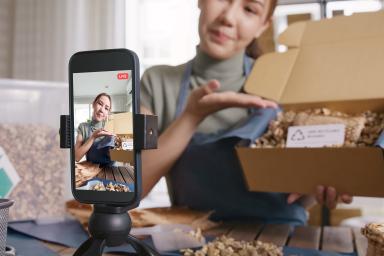How to promote your business locally
As a small business owner, you may aim to drive business success by marketing your products or services to your local community.
This can be a smart move as your business may have many potential local customers.
However, it can pay to have a well-defined local promotion strategy to make the most of the customer pool on your doorstep.
While marketing generally costs time and money, there are many effective and affordable (or even free) ways to get your business seen and heard locally.
From setting up loyalty schemes to optimising your website’s Google ranking, read on to discover how to promote your business locally.
11 ways to promote your local business
Create a free Google Business Profile
Setting up a Google Business Profile lets you manage how your business appears online.
This involves listing on Google search results pages or Google Maps when users search for local businesses.
This listing will also display any Google reviews your business has.
Here’s how to set up your Google Business Profile:
- create and verify – make a Google account if you don’t have one and verify it
- add your business details – enter your business name, phone number, email, website, address, and opening hours (if applicable)
- upload photos – add pictures of your products, services, and location to make your profile more attractive.
You can optimise your Google Business Profile to improve visibility in local search results and attract more customers.
For example, you can:
- respond regularly to reviews – this helps boost customer engagement and trust
- make the most of the visual elements – use high-quality images and videos that best showcase your products, services, and premises
- write a clear description – explain what your business does, highlight what makes you unique, and use important keywords
- write regular updates – share news and promotions to keep your profile fresh.
By setting up and optimising your Google Business Profile, you can boost your online visibility, make it easier to connect with customers, and improve your website’s search ranking.
It could also help you boost sales and yield a higher return on investment.
Use local listings and directories
Many professional organisations, such as the Chambers of Commerce, have online listings and directories of local businesses.
Getting your business listed on these can offer several benefits:
- increase visibility – more people will find you online
- easier networking – connect with other local businesses
- boost local Search Engine Optimisation (SEO) – improve your ranking position in search engine results pages
- enhance reputation – build a stronger brand image.
There are also several apps and directories where you can list your business free of charge.
For example, Yell offers a free business listing where you can share your details and respond to customer comments.
Consider creating a free business page on the NextDoor app.
Here, you can post updates for the local community and promote your business.
Some directories may charge a fee, so research and choose the ones that fit your budget.
Many online community boards are free and can help you connect with potential local customers.
Request customer reviews on multiple platforms
Customer reviews can be a great way to encourage new business from people in your community.
Potential customers often trust their neighbours’ opinions more than a company's marketing materials.
As well as using your Google Business Profile for reviews, consider asking your customers to write reviews on official platforms such as Trustpilot, Yell, and Facebook to help improve your online visibility and reputation.
You could feature the best comments on printed materials and your website, featuring links to encourage more feedback.
Even if you receive the odd bad review, you will have the chance to respond to comments and make sure any unhappy customers are satisfied.
Sponsor or participate in local events
Sponsoring or taking part in local events can be a good way to promote your business locally.
It helps you connect and build relationships with potential customers.
When choosing events to support, pick ones that match your business's values and target audience.
For instance, if you own a beauty business, consider attending wedding fairs, local markets, or fashion shows.
Keep in mind that participating in events might cost money, so research different events and choose the most relevant.
Consider getting involved in community service or local charity events.
This will not only increase your visibility but also help your local community.
Offer local discounts and rewards
Offering loyalty discounts or reward schemes for repeat purchases is a popular way to thank local customers for their support and encourage them to make future purchases.
For example, you could offer a discount after a certain number of purchases, store credit, exclusive promotions at certain times of the year, access to exclusive deals, or free gifts.
Make business flyers and cards
Flyers and business cards are a tried-and-true local marketing tactic – and for a good reason.
Professional, eye-catching marketing materials can be created on a minimal budget, using free design tools such as Canva.
You can then print them at home or through a printing business.
Flyers can be posted through your neighbours' letterboxes, or displayed on local message boards and in shop windows.
You could also ask other local businesses, such as corner shops or cafés, to display your business cards for shoppers as they wait or pay.
Hold competitions and contests
Hosting local competitions can help you connect with your community, make more people aware of your brand, boost sales, and improve your online presence.
For example, you could run a social media contest in which participants post their entries and use a specific hashtag to make them easy to find.
Competitions are also a great way to create buzz around new products or services, which you can offer as prizes.
Secure local press coverage
Your local press can include regional newspapers – both print and online – as well as local bloggers and community magazines.
Securing coverage could help promote your start-up at various points in your journey, such as during its launch, or when a new product or service is created.
The local press may also offer opportunities to comment on local events or subjects relevant to your business.
Collaborate with other local businesses and charities
Local networking can offer multiple benefits when starting your business journey.
Other business owners may be able to give you valuable insights into the local market and share what they’ve learned while building their own businesses.
Collaborating could include:
- running competitions – prizes could feature a variety of products from multiple businesses
- cross-promotion – several businesses could promote each other’s products or services to their respective customer bases through in-store displays, social media shoutouts, or bundled offers
- referral discounts – one business refers its customers to another, offering incentives such as discounts or rewards.
Partnering with local charities could also be a way to give back to your local community while promoting your business and boosting your brand’s reputation.
This could involve sponsoring or hosting charity events or donating a portion of your monthly or annual profits.
Implement local SEO on your website
Local SEO (search engine optimisation) involves making your business more visible in online search results within your specific geographical area.
The idea is that when people nearby search for the products or services you offer, your business will appear in their results.
This can be achieved using various SEO methods, such as keyword optimisation.
Keywords are phrases people type into Google, such as 'Italian restaurant near me' or 'north London taxi service’.
By targeting these keywords, your website may appear in Google results for these local searches, potentially leading to new business.
You can also collaborate with other local businesses and link to one another’s websites to improve your SEO.
SEO can be free, but you may need to pay subscription fees to use specialist tools.
You could also work with SEO professionals to maximise your impact if you have the budget.
Read our guide to six ways to boost your website's SEO.
Pay for local advertising
You can directly target potential customers by advertising in local media.
This can include local radio, adverts in local newspapers and magazines, social media ads, or online advertising.
Social media ads and online advertising can also be used to target your local area using filtering options.
For example, using Google Ads involves using filters and keywords to target your ideal customers when they use Google, putting your business above the competition.
Find out more about how to advertise your business.
If you don’t want to spend money on advertising, you can use your social platforms to spread the word about your business.
Read our guide on how to make social media work for your small business.
Learn with Start Up Loans and help get your business off the ground
Thinking of starting a business? Check out our free online courses in partnership with the Open University on being an entrepreneur.
Our free Learn with Start Up Loans courses include:
- Entrepreneurship – from ideas to reality
- First steps in innovation and entrepreneurship
- Entrepreneurial impressions – reflection
Plus free courses on climate and sustainability, teamwork, entrepreneurship, mental health and wellbeing.
Disclaimer: The Start -Up Loans Company makes reasonable efforts to keep the content of this article up to date, but we do not guarantee or warrant (implied or otherwise) that it is current, accurate or complete. This article is intended for general information purposes only and does not constitute advice of any kind, including legal, financial, tax or other professional advice. You should always seek professional or specialist advice or support before doing anything on the basis of the content of this article.
The Start-Up Loans Company is not liable for any loss or damage (foreseeable or not) that may come from relying on this article, whether as a result of our negligence, breach of contract or otherwise. “Loss” includes (but is not limited to) any direct, indirect or consequential loss, loss of income, revenue, benefits, profits, opportunity, anticipated savings, or data. We do not exclude liability for any liability which cannot be excluded or limited under English law. Reference to any person, organisation, business, or event does not constitute an endorsement or recommendation from The Start-Up Loans Company, its parent company British Business Bank plc, or the UK Government.



